We post news and comment on federal criminal justice issues, focused primarily on trial and post-conviction matters, legislative initiatives, and sentencing issues.

BRINGING FORTH A MOUSE
 From time to time, we rail about hopemongerers, people who traffic on the desperation of federal inmates to make a buck. The people who do this spectrum from those proceeding out of naïve self interest, like the Colorado prison reform group that is really just the families of the co-conspirators in a white-collar fraud, to the genuinely corrupt, like the bunch selling a sentence reduction scam.
From time to time, we rail about hopemongerers, people who traffic on the desperation of federal inmates to make a buck. The people who do this spectrum from those proceeding out of naïve self interest, like the Colorado prison reform group that is really just the families of the co-conspirators in a white-collar fraud, to the genuinely corrupt, like the bunch selling a sentence reduction scam.
(A happy note: Alvin Warrick, aka “Pete Candlewood,” last week got slammed with a 235-month sentence in the Southern District of Florida, while sidekick Colitha Bush got 96 months – we’ll be sure to offer them the Rule 35 Deal of the Century).
But sometimes someone with the most altruistic of motives inadvertently stirs the pot of hope, sending the system into a tizzy for no good reason. And that brings us to our friends at Prisology.org.
Prisology is an on-again off-again prison reform group headed by Brandon Samples, a former federal inmate who is now a practicing attorney. Brandon’s a sharp guy, someone who has been in both seats at the defendant’s table, as a defendant facing a harsh sentence and as counsel working to get his client the best outcome possible.
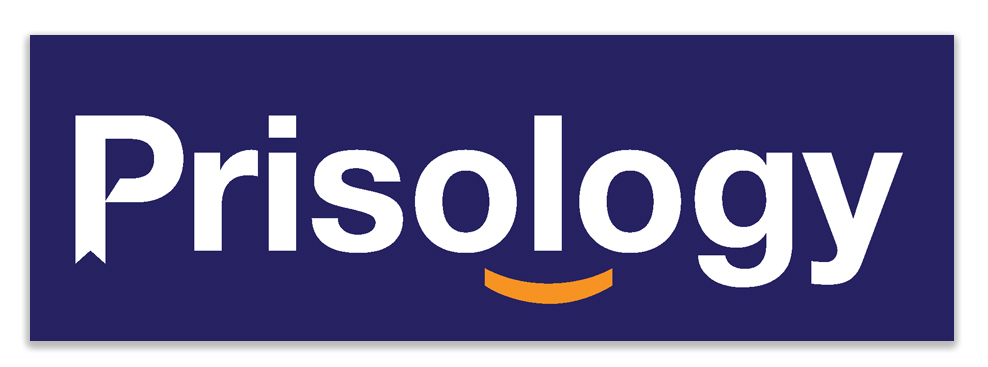 Prisology, formed in 2013, became active in about 2014, organizing a letter-writing campaign to the U.S. Sentencing Commission when Amendment 782 – retroactivity of the two-level reduction in drug base offense levels contained in USSG Sec. 2D1.1(c) – was being considered. The organization’s website touts its involvement in the 2014 efforts, claiming that its “monumental effort” in submitting tens of thousands of letters to the Sentencing Commission in support of retroactive application of the 2-level drug reduction “helped prompt change to harsh drug guidelines.” Indeed, in a press release issued in March 2015, Prisology said, “Key to the Sentencing Commission’s unanimous approval of Amendment 782 was its receipt of over 75,000 comments favoring the reform, mostly prompted by an intensive email, letter writing and social media campaign organized by Prisology. This is the first major victory for the barely year-old nonprofit organization dedicated to criminal justice system reform.”
Prisology, formed in 2013, became active in about 2014, organizing a letter-writing campaign to the U.S. Sentencing Commission when Amendment 782 – retroactivity of the two-level reduction in drug base offense levels contained in USSG Sec. 2D1.1(c) – was being considered. The organization’s website touts its involvement in the 2014 efforts, claiming that its “monumental effort” in submitting tens of thousands of letters to the Sentencing Commission in support of retroactive application of the 2-level drug reduction “helped prompt change to harsh drug guidelines.” Indeed, in a press release issued in March 2015, Prisology said, “Key to the Sentencing Commission’s unanimous approval of Amendment 782 was its receipt of over 75,000 comments favoring the reform, mostly prompted by an intensive email, letter writing and social media campaign organized by Prisology. This is the first major victory for the barely year-old nonprofit organization dedicated to criminal justice system reform.”
Really? This would certainly be news to Families Against Mandatory Minimums, the 25-year old big gorilla in criminal justice reform. FAMM took credit for generating most of the 65,000 plus letters the Sentencing Commission received, a claim that – given FAMM’s prominence in sentencing reform – is much easier to swallow that Prisology’s assertion that it organized the effort.
 In all fairness, even if one credits Prisology’s rather far-fetched contention that it ramrodded the 2014 drug reduction retroactivity decision, the organization is pretty much the rooster taking credit for the sun rising. After all, in 2007, the Sentencing Commission reduced the offense levels for drug quantities, and made those changes retroactive in Amendment 706. In 2011, the Sentencing Commission again made reduced crack cocaine offense levels retroactive in Amendments 750 and 759. After those retroactive reductions, the 2014 decision was hardly a seismic event.
In all fairness, even if one credits Prisology’s rather far-fetched contention that it ramrodded the 2014 drug reduction retroactivity decision, the organization is pretty much the rooster taking credit for the sun rising. After all, in 2007, the Sentencing Commission reduced the offense levels for drug quantities, and made those changes retroactive in Amendment 706. In 2011, the Sentencing Commission again made reduced crack cocaine offense levels retroactive in Amendments 750 and 759. After those retroactive reductions, the 2014 decision was hardly a seismic event.
Plus, it’s not like the retroactivity decision had any natural predators. The Obama Administration supported it. There was no effort in Congress to thwart it. The Sentencing Commission’s vote on retroactivity was unanimous. And FAMM, a considerably larger advocacy group, was generally credited at the time with generating a vast volume of mail in support of retroactivity.
After 2014, Prisology seemed to fall dormant. It posted two press releases in early 2015, one of which was its self-adulation for spearheading the 2014 retroactivity decision. There was one project, Prisology’s Freedom of Information Act lawsuit against the Federal Bureau of Prisons, in which the nonprofit had its hat handed to it by the D.C. Circuit earlier this year. But otherwise… nothing.
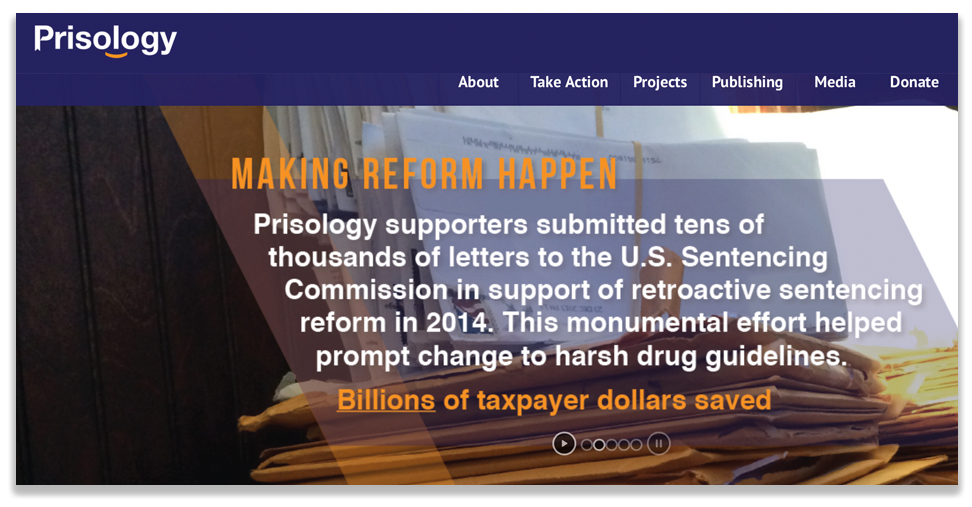 Until now. A few weeks ago, we heard from a number of inmate readers asking us what was about to happen in the sentence reform world. It seems they had received emails from well-known federal post-conviction attorney Jeremy Gordon – a Prisology board member who was at the helm of the FOIA suit when it foundered on the D.C. Circuit’s shoals – who told them something big was in the works: One wrote
Until now. A few weeks ago, we heard from a number of inmate readers asking us what was about to happen in the sentence reform world. It seems they had received emails from well-known federal post-conviction attorney Jeremy Gordon – a Prisology board member who was at the helm of the FOIA suit when it foundered on the D.C. Circuit’s shoals – who told them something big was in the works: One wrote
Do you know who Jeremy Gordon is? He’s a federal lawyer that sends out newsletters every week. Any way he said to tune in next week because there’s going to be a big sentencing reform push bigger than the drugs minus 2 and has the potential to affect everyone in federal prison… have you heard anything?
Yes, we have now heard something. After all of the hoopla, Jeremy, Brandon and Prisology last week brought forth a… mouse.
It seems that Prisology has drafted a new sentencing table (Chapter 5A of the Guidelines), which proposes substantially lower sentencing ranges for each step in the chart than those in the current table. It wants to generate 50,000 letters to the Sentencing Commission in an effort to browbeat the agency into adopting the proposal. The organization includes a form on its website that you can complete and submit online, complete (of course) with your name, address, email and phone number.
OK, so what could possibly be wrong with this? To be sure, the Guidelines would benefit from a more rational sentencing range chart. And, as one inmate complained to us, at least this constitutes “doing something” toward sentence reform. Something’s always better than nothing, right?
 We have two – maybe two-and-a-half – complaints with Prisology’s approach. First, the Sentencing Commission’s statutory mandate nowhere mentions vox populi. The Commission is a judicial agency, not a representative democracy, and flooding it with 50,000 online forms, all of which are different names attached to the same message written by Prisology, is not going to sway any bureaucrat. Online petitions do not get read. If the sentencing tables should be rewritten, then a compelling case should be made, one that addresses the sentencing factors of 18 USC 3553(a) and that statutory goals of the Commission. After all, 50,000 online signatures in a country where more than half of Americans believe aliens have visited earth does not really establish much.
We have two – maybe two-and-a-half – complaints with Prisology’s approach. First, the Sentencing Commission’s statutory mandate nowhere mentions vox populi. The Commission is a judicial agency, not a representative democracy, and flooding it with 50,000 online forms, all of which are different names attached to the same message written by Prisology, is not going to sway any bureaucrat. Online petitions do not get read. If the sentencing tables should be rewritten, then a compelling case should be made, one that addresses the sentencing factors of 18 USC 3553(a) and that statutory goals of the Commission. After all, 50,000 online signatures in a country where more than half of Americans believe aliens have visited earth does not really establish much.
Our second complaint is more significant. By trumpeting this online petition so prominently, and billing it to inmates as “bigger than the drugs minus 2,” as our correspondent put it, Prisology has committed the cardinal sin of hopemongering. Let’s say for a moment that the Sentencing Commission really did adopt the new sentencing table. Nothing about that adoption makes the change retroactive. Rather, as with all of the drug reductions, the Commission would have to hold a second proceeding to determine retroactivity.
And there’s the rub. In considering retroactivity, the Commission considers, among other factors, (1) the purpose of the amendment, (2) the magnitude of the change in the guideline range made by the amendment, and (3) the difficulty of applying the amendment retroactively. See USSG Sec. 1B1.10. In 2010, when the Commission abolished the extra criminal history point assigned for “recency,” that is, when the new crime occurred within two years of getting off parole or supervised release for a prior crime, the Justice Department and the Judicial Conference strongly opposed retroactivity for the “recency” amendment – which would have affected maybe 7,997 prisoners – because of the disruption such a change would have caused the court system. Bowing to those views, the Sentencing Commission turned down the retroactivity proposal.
 How likely would the Sentencing Commission be to approve retroactivity for over 150,000 prisoners, so that each could file a petition with his or her judge seeking resentencing at a lower sentencing range?
How likely would the Sentencing Commission be to approve retroactivity for over 150,000 prisoners, so that each could file a petition with his or her judge seeking resentencing at a lower sentencing range?
Finally, our complaint No. 2½: We cannot help sensing that maybe Prisology’s primary purpose in the online petition is to capture data. As Heather Horn wrote in The Atlantic:
It’s the great lie of online organizing: that your voice to Congress or your voice to whomever can make a difference. It can, it should, but not through them. Nearly every organization in Washington is focused on one thing–inventing new and interesting ways to get your email address. And they want your email address so that they can ask you for money.
You don’t need a physical address, phone number and email address to sign an online petition. Congress alone gets over a billion emails annually. No one has time to read them, let alone record the user information. The organization, however, does, and it gains a valuable email, phone and address database from which to solicit funds.
We are left with the disquieting feeling that Prisology may be as interested in bulking up its email list as it is in selling the Sentencing Commission its new Sentencing Table.
Is the Prisology online petition push a scam? We have no opinion on that, but it has clearly raised inmate hopes without foundation and has little chance of having any impact.
The Atlantic, Your Online Petition Is Useless (Aug. 12, 2010)
– Thomas L. Root

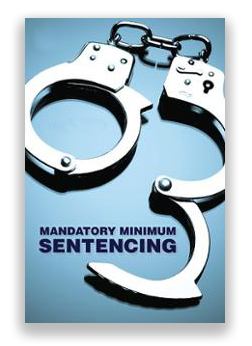 Everyone appreciates on a visceral level how badly Congressional meddling in sentencing – in the form of statutorily-imposed mandatory minimum sentences – has loaded the BOP with inmates serving harsh sentences and skewed any attempt by the United States Sentencing Commission to impose a rational system. Thanks to a USSC report issued yesterday, everyone’s understanding of mandatory minimum sentence havoc can be intellectual as well.
Everyone appreciates on a visceral level how badly Congressional meddling in sentencing – in the form of statutorily-imposed mandatory minimum sentences – has loaded the BOP with inmates serving harsh sentences and skewed any attempt by the United States Sentencing Commission to impose a rational system. Thanks to a USSC report issued yesterday, everyone’s understanding of mandatory minimum sentence havoc can be intellectual as well. Other interesting facts gleaned from the Report:
Other interesting facts gleaned from the Report: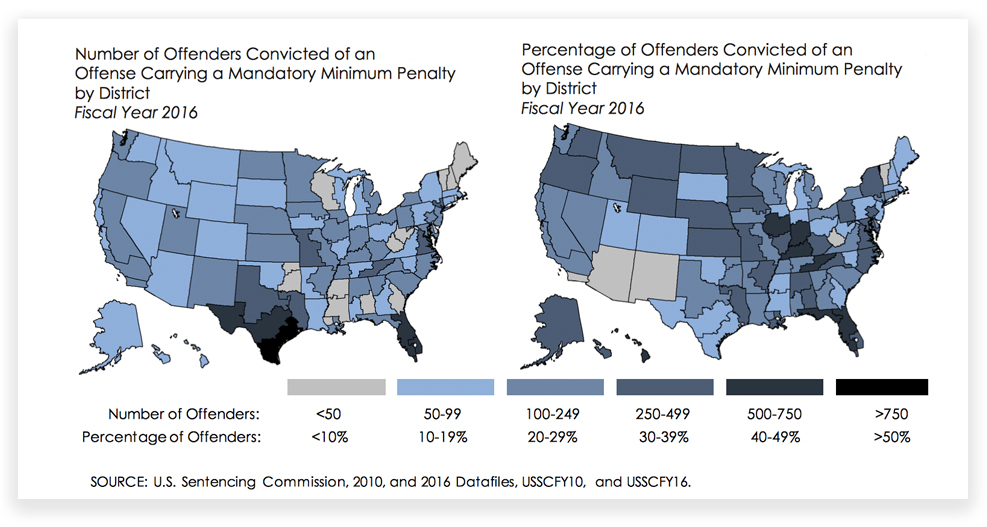 • Fewer that 10% of defendants in Vermont, West Virginia, New Mexico and Arizona were convicted of mandatory minimum offenses. But in middle Illinois, southern Indiana, western Kentucky, eastern Tennessee, and northern and middle Florida, between 40% and 50% of defendants were hit with mandatory minimums.
• Fewer that 10% of defendants in Vermont, West Virginia, New Mexico and Arizona were convicted of mandatory minimum offenses. But in middle Illinois, southern Indiana, western Kentucky, eastern Tennessee, and northern and middle Florida, between 40% and 50% of defendants were hit with mandatory minimums.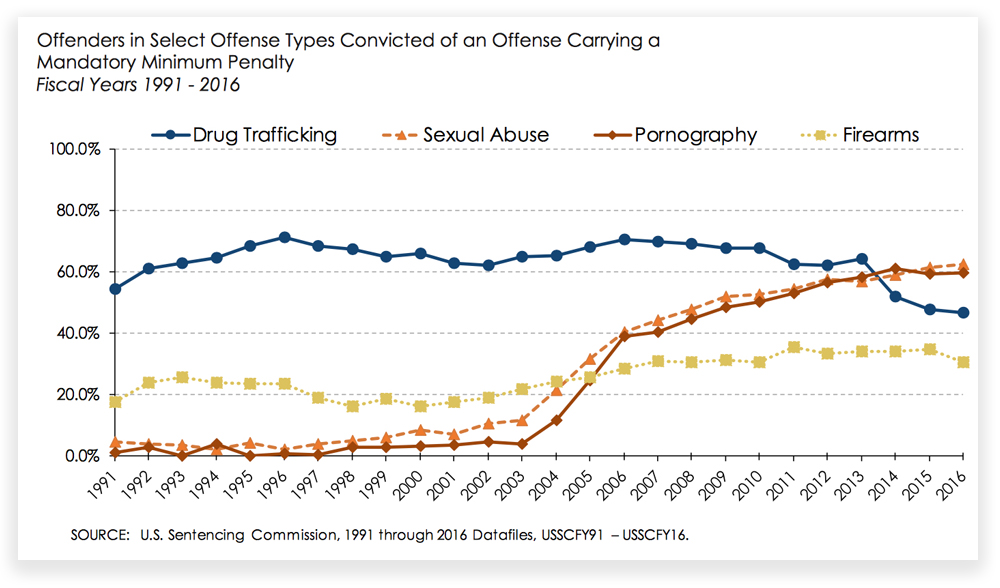 Judge William H. Pryor, Jr., Acting Chair of the Commission, said in a press release that “when Congress created the Commission, Congress empowered it to serve ‘as a clearinghouse and information center’ about federal sentencing and to assist Congress, the federal courts, and federal departments in the development of sound sentencing policies… The Commission has published this report to fulfill that Congressional mandate.”
Judge William H. Pryor, Jr., Acting Chair of the Commission, said in a press release that “when Congress created the Commission, Congress empowered it to serve ‘as a clearinghouse and information center’ about federal sentencing and to assist Congress, the federal courts, and federal departments in the development of sound sentencing policies… The Commission has published this report to fulfill that Congressional mandate.”











